-
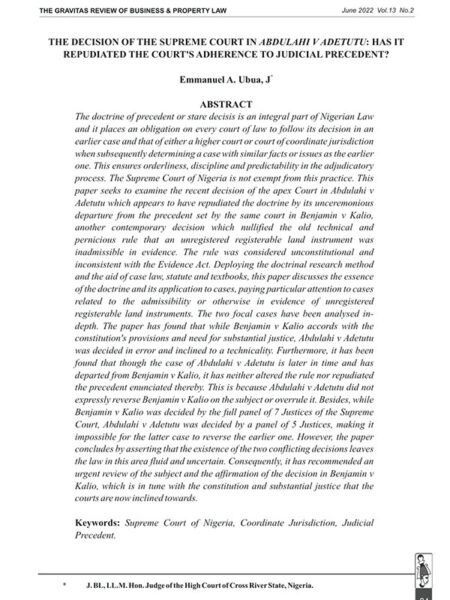
The Decision of The Supreme Court in Abdulahi v Adetutu: Has it Repudiated the Court’s Adherence to Judicial Precedent?
0₦2,500.00Honourable Justice Emmanuel Ubua of the High Court of Cross River State, in his article, The Decision of The Supreme Court in Abdulahi v Adetutu: Has it Repudiated the Court’s Adherence to Judicial Precedent? examines the decision of the Supreme Court in Abdulahi v Adetutu which appears to have repudiated the doctrine of stare decisis by its unceremonious departure from the precedent set by the same court in Benjamin v Kalio. The Supreme Court in Kalio nullified the old technical and pernicious rule that an unregistered registerable land instrument was inadmissible in evidence. The rule was considered unconstitutional and inconsistent with the Evidence Act. However, in the case of Abdulahi v Adetutu which was decided later, the Supreme Court seems to have somersaulted when it held that an unregistered instrument was inadmissible in evidence for breaching provisions of the Land Instruments Registration Law. Hon Justice Ubua comprehensively reviews the cases of Kalio and Adetutu and posits that while Kalio accords with constitutional provisions and the need for substantial justice, Adetutu was decided in error and inclined to technicality. Hon Justice Ubua recommends an urgent affirmation of the decision in Kalio, which is in tune with the constitution and substantial justice.
-
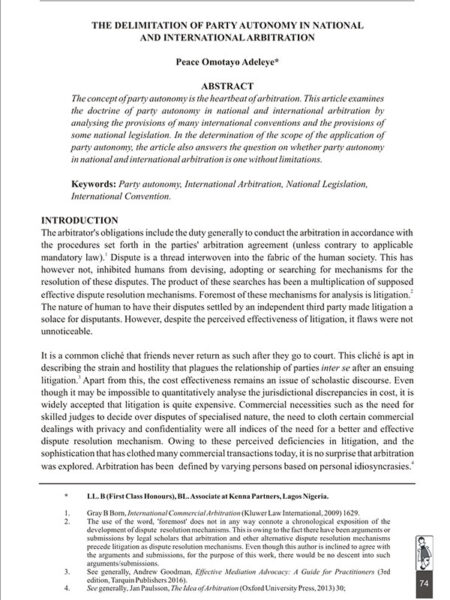
The Delimitation of Party Autonomy in National and International Arbitration
0₦2,500.00Peace Adeleye, Associate at Kenna Partners, Lagos Nigeria in her paper, The Delimitation of Party Autonomy in National and International Arbitrations, posits that the principle of party autonomy, the freedom of parties to a contract/arbitration agreement to make rules that govern them without the need for an intervention of a third party, is the soul and heart of arbitration. Adeleye comprehensively reviews national and international legislation enabling party autonomy and argues that much as parties to an arbitration agreement may want their freedom to contract to be limitless, there are indeed limits to the freedom. She discusses the limits of party autonomy in national and international arbitrations.
-
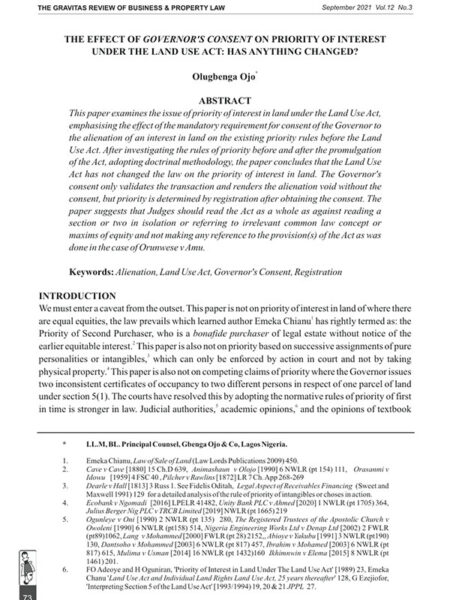
The Effect of Governor’s Consent on Priority of Interest Under the Land Use Act: Has Anything Changed?
0₦2,500.00Olugbenga Ojo, Principal Counsel at Gbenga Ojo & Co, in his article, The Effect of Governor’s Consent on Priority of Interest Under the Land Use Act: Has Anything Changed? examines the issue of priority of interest in land under the Land Use Act and the effect of the Governor’s Consent. He considers the rule of priority before the enactment of the Land Use Act, and under the Act to determine whether there are changes. He concludes that the Governor’s Consent only validates a transaction and renders an alienation void without the Consent, but priority is determined by registration after obtaining the Consent. He suggests that Judges should read the Land Use Act as a whole as against reading a section or two in isolation or referring to irrelevant common law concepts or maxims of equity as was done in the case of Orunwese v Amu.
-
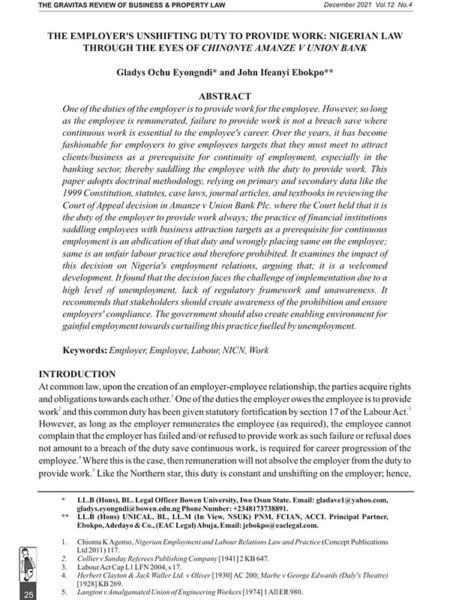
The Employer’s Unshifting Duty to Provide Work: Nigerian Law through the Eyes of Chinonye Amanze v Union Bank
0₦2,500.00Gladys Eyongndi, Legal Officer Bowen University, and John Ebokpo of EAC Legal, in their article, The Employer’s Unshifting Duty to Provide Work: Nigerian Law through the Eyes of Chinonye Amanze v Union Bank, laud the decision of the National Industrial Court that the employer has to provide work always. The practice of financial institutions saddling employees with deposit targets as a prerequisite for continued employment is an abdication of that duty, as the employee never has to go looking for work to sustain the business of the employer. Eyongndi and Ebokpo examine Nigerian law on an employer’s duty to provide work and the challenges facing employees in relation to the employer’s duty.
-
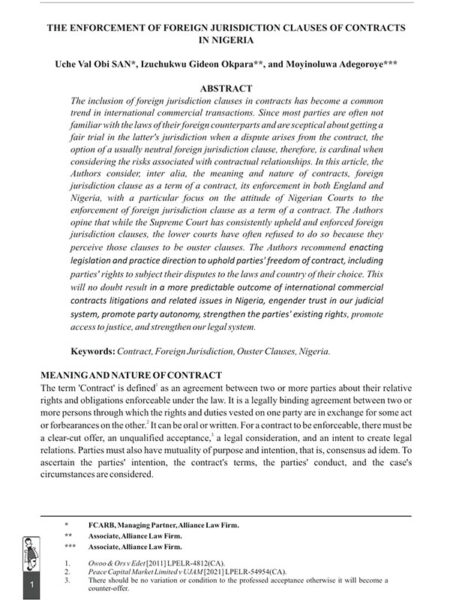
The Enforcement of Foreign Jurisdiction Clauses of Contracts in Nigeria
0₦2,500.00Uche Val Obi SAN, Izuchukwu Okpara and Moyinoluwa Adegoroye, all of the Alliance Law Firm, in their article, The Enforcement of Foreign Jurisdiction Clauses of Contracts in Nigeria, note that the inclusion of foreign jurisdiction clauses in contracts has become a common trend in international commercial transactions. Since most parties are often not familiar with the laws of their foreign counterparts and are sceptical about getting a fair trial in the latter’s jurisdiction when a dispute arises, the option of a usually neutral foreign jurisdiction clause, therefore, is cardinal when considering the risks associated with contractual relationships. Uche Obi SAN et al consider the meaning and nature of contracts, foreign jurisdiction clause as a term of a contract, and its enforcement in England and Nigeria, with particular focus on the attitude of Nigerian Courts to the enforcement of foreign jurisdiction clause as a term of a contract. They opine that while the Supreme Court has consistently upheld and enforced foreign jurisdiction clauses, the lower courts have often refused to do so because they perceive those clauses to be ouster clauses.
-
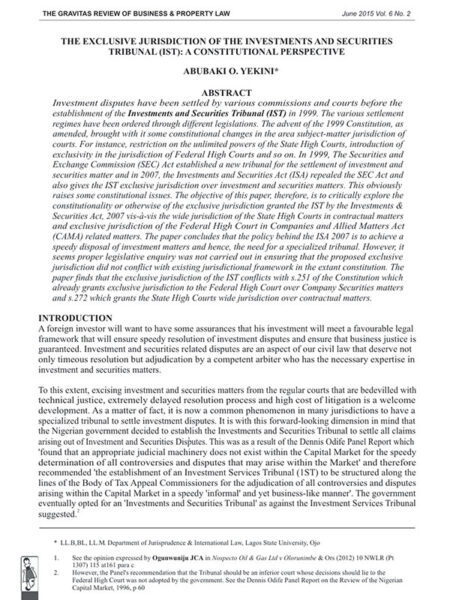
The Exclusive Jurisdiction of the Investments and Securities Tribunal (IST): A Constitutional Perspective
0₦2,500.00Abubaki Yekini of the Lagos State University in his article, “The Exclusive Jurisdiction of the Investments and Securities Tribunal: A Constitutional Perspective”, examines the constitutionality of the exclusive jurisdiction conferred on the Investments and Securities Tribunal (IST) by the Investments and Securities Act in view of Section 251(e) of the 1999 Constitution and posit that as the IST is not listed in the Constitution as a superior court, the fate that befell the defunct VAT Tribunal and the National Industrial Court (before the third alteration to the 1999 Constitution) may lie in wait it.
-
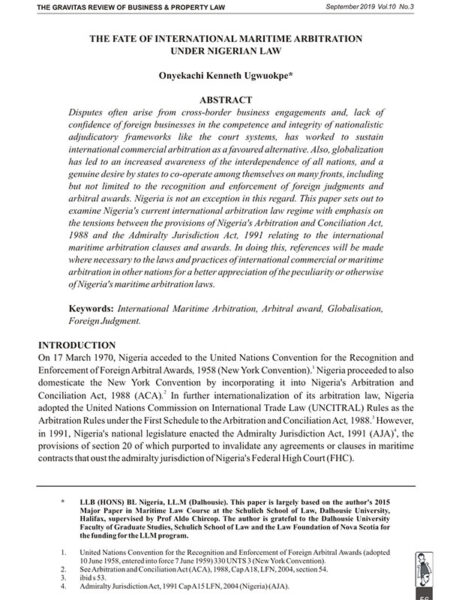
The Fate of International Maritime Arbitration under Nigerian Law
0₦2,500.00Onyekachi Ugwuokpe in his article, The Fate of International Maritime Arbitration Under Nigerian Law, dabbles into the exciting debate about the uncertainty of international maritime arbitration in Nigeria. While section 34 of the Arbitration and Conciliation Act (ACA) 1988 (modelled on the UNCITRAL Model Law on International Commercial Arbitration 1985) forbids Nigerian courts from intervening in any arbitral matter except as allowed under the Act, section 20 of the Admiralty Jurisdiction Act (AJA) 1991 invalidates any contractual provision that ousts the jurisdiction of Nigerian courts in the circumstances listed in the section. Onyekachi, in his usual inimitable style, goes to town, comprehensively reviewing judicial cases and learned commentaries and concluding that there is indeed a lacuna awaiting judicial clarity.
-
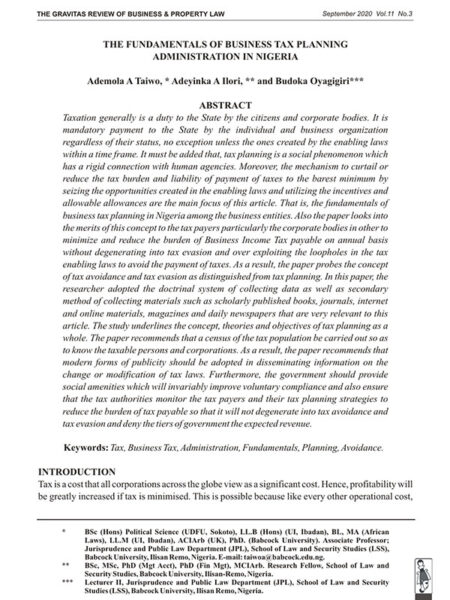
The Fundamentals of Business Tax Planning Administration in Nigeria
0₦2,500.00Dr Ademola Taiwo, Dr Adeyinka Ilori, and Budoka Oyagigiri all of Babcock University Ilisan Remo Nigeria, in their article,The Fundamentals of Business Tax Planning Administration in Nigeria, posit that the mechanisms to curtail or reduce a taxpayer’s burden to the barest minimum by seizing the opportunities created in tax laws and utilizing the incentives and allowances are the main focus of tax planning. Dr Ademola Taiwo et al examine the concepts of tax avoidance, tax evasion and tax planning for business entities. They consider the theories of tax planning and management, the essence of tax management, and forms and incidents of tax planning in the Nigerian tax administration.
-

The Gravitas Nigerian Tax Handbook and Statutes
0₦50,000.00The Gravitas Nigerian Tax Handbook and Statutes, written and complied by Professor Taofeeq Abdulrazaq, SAN, Theophilus Emuwa and Moshood Shehu, is a comprehensive reference work written by experienced professionals and covering major aspects of Nigerian taxation. The Handbook offers a thorough guide to Nigerian taxation.
-
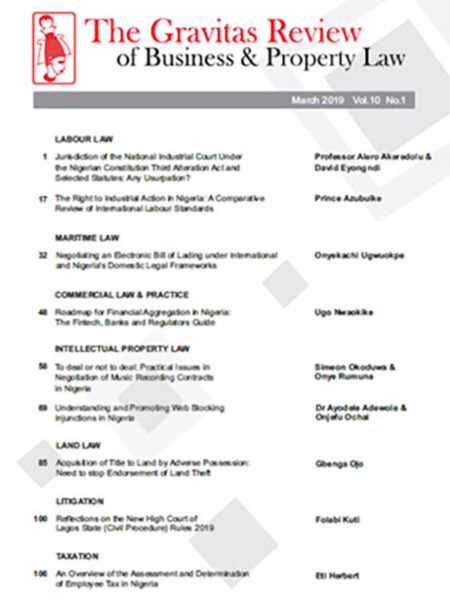
The Gravitas Review of Business & Property Law Vol.10 No.1
0₦5,000.00In this issue of The Gravitas Review of Business & Property Law Vol.10 No.1, there are well researched articles on:
- Labour Law
- Maritime Law
- Commercial Law & Practice
- Intellectual Property Law
- Land Law
- Litigation Practice & Procedure
- Taxation
-

The Gravitas Review of Business & Property Law Vol.10 No.1 – E-Book
0₦5,000.00In this issue of The Gravitas Review of Business & Property Law Vol.10 No.1, there are well researched articles on:
- Labour Law
- Maritime Law
- Commercial Law & Practice
- Intellectual Property Law
- Land Law
- Litigation Practice & Procedure
- Taxation
-

The Gravitas Review of Business & Property Law Vol.10 No.1 – Print
0₦5,000.00In this issue of The Gravitas Review of Business & Property Law Vol.10 No.1, there are well researched articles on:
- Labour Law
- Maritime Law
- Commercial Law & Practice
- Intellectual Property Law
- Land Law
- Litigation Practice & Procedure
- Taxation
The Gravitas Review of Business & Property Law



